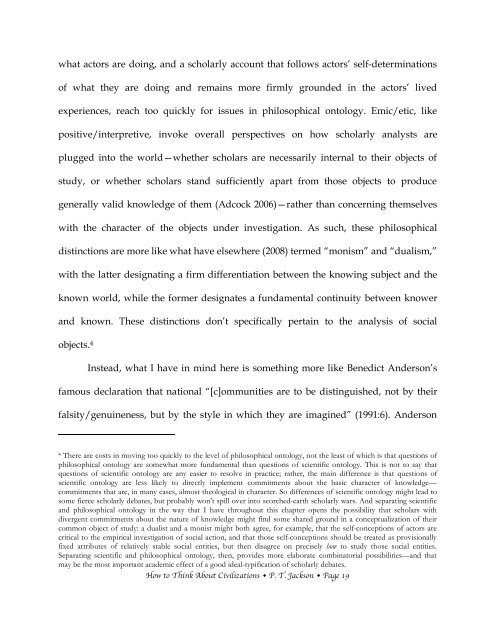How to Think About Civilizations - The Watson Institute for ...
How to Think About Civilizations - The Watson Institute for ...
How to Think About Civilizations - The Watson Institute for ...
Create successful ePaper yourself
Turn your PDF publications into a flip-book with our unique Google optimized e-Paper software.
what ac<strong>to</strong>rs are doing, and a scholarly account that follows ac<strong>to</strong>rs’ self-determinations<br />
of what they are doing and remains more firmly grounded in the ac<strong>to</strong>rs’ lived<br />
experiences, reach <strong>to</strong>o quickly <strong>for</strong> issues in philosophical on<strong>to</strong>logy. Emic/etic, like<br />
positive/interpretive, invoke overall perspectives on how scholarly analysts are<br />
plugged in<strong>to</strong> the world—whether scholars are necessarily internal <strong>to</strong> their objects of<br />
study, or whether scholars stand sufficiently apart from those objects <strong>to</strong> produce<br />
generally valid knowledge of them (Adcock 2006)—rather than concerning themselves<br />
with the character of the objects under investigation. As such, these philosophical<br />
distinctions are more like what have elsewhere (2008) termed “monism” and “dualism,”<br />
with the latter designating a firm differentiation between the knowing subject and the<br />
known world, while the <strong>for</strong>mer designates a fundamental continuity between knower<br />
and known. <strong>The</strong>se distinctions don’t specifically pertain <strong>to</strong> the analysis of social<br />
objects. 4<br />
Instead, what I have in mind here is something more like Benedict Anderson’s<br />
famous declaration that national “[c]ommunities are <strong>to</strong> be distinguished, not by their<br />
falsity/genuineness, but by the style in which they are imagined” (1991:6). Anderson<br />
4 <strong>The</strong>re are costs in moving <strong>to</strong>o quickly <strong>to</strong> the level of philosophical on<strong>to</strong>logy, not the least of which is that questions of<br />
philosophical on<strong>to</strong>logy are somewhat more fundamental than questions of scientific on<strong>to</strong>logy. This is not <strong>to</strong> say that<br />
questions of scientific on<strong>to</strong>logy are any easier <strong>to</strong> resolve in practice; rather, the main difference is that questions of<br />
scientific on<strong>to</strong>logy are less likely <strong>to</strong> directly implement commitments about the basic character of knowledge—<br />
commitments that are, in many cases, almost theological in character. So differences of scientific on<strong>to</strong>logy might lead <strong>to</strong><br />
some fierce scholarly debates, but probably won’t spill over in<strong>to</strong> scorched-earth scholarly wars. And separating scientific<br />
and philosophical on<strong>to</strong>logy in the way that I have throughout this chapter opens the possibility that scholars with<br />
divergent commitments about the nature of knowledge might find some shared ground in a conceptualization of their<br />
common object of study: a dualist and a monist might both agree, <strong>for</strong> example, that the self-conceptions of ac<strong>to</strong>rs are<br />
critical <strong>to</strong> the empirical investigation of social action, and that those self-conceptions should be treated as provisionally<br />
fixed attributes of relatively stable social entities, but then disagree on precisely how <strong>to</strong> study those social entities.<br />
Separating scientific and philosophical on<strong>to</strong>logy, then, provides more elaborate combina<strong>to</strong>rial possibilities—and that<br />
may be the most important academic effect of a good ideal-typification of scholarly debates.<br />
<strong>How</strong> <strong>to</strong> <strong>Think</strong> <strong>About</strong> <strong>Civilizations</strong> • P. T. Jackson • Page 19
















